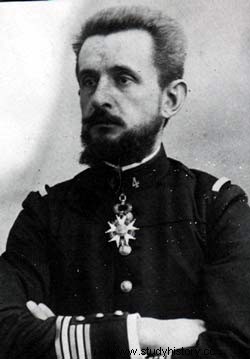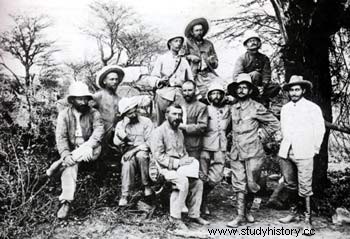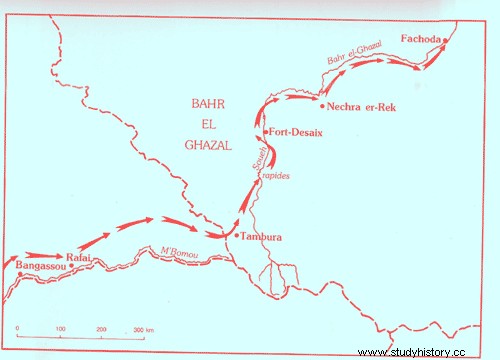-

- Merchant
Still a child, he was admitted as a junior clerk to Maître Blondel, a notary in Thoissey. Who could then have predicted his epic destiny? And yet the notary, a good man, advises Marchand to get involved.
Did he catch in his young clerk one of his "anxious looks of a lion cub in a cage?" writes Mr. Delebecque. Marchand's eyes are black, they reflect a deep inner life. His hours of daydreaming take him far from the notarial profession and these daydreams are daydreams of action, of ideals; no doubt already epic daydreams. But how many young people who dreamed of epic never left the beaten track, the warmth of the rooms and the dull repetition of office hours...
Will he accept, the slavery of registers, the softening calm of short walks in the Dombes region, the abandonment of one's epic dreams? Nope ! We know from his intimate notes that between the ages of fourteen and seventeen he had several times the sudden appearance of a landscape remarkable for the intensity of blues and greens in an abundance of foliage. This apparition made him lose all notion of where he was and of the beings around him, it seemed to him a presentiment.
-

- Merchant
By his commitment, then the Military School of Saint-Maixent, he quickly reached the epaulette. The contact with the army was hard, but the teenager lost none of his mysticism and his ideal in the face of difficulties. His will became fierce. The man grew stronger in the ordeal. Black eyes in a second ignite with enthusiasm or darken with anger. By disembarking in Senegal, did Marchand hope to discover this landscape of violent “blue and green” tones? Disappointment ! The coast is flat, bare, parched. As soon as he landed, twenty-four hours apart, his captain and his lieutenant died. Here is a new enemy:death ... a very frequent companion on the epic paths. He despises her, and at her request, gains the front.
-

- The Merchant epic
In 1889, he received the baptism of fire at the capture of Koundian; wounded he writes:“My duty is to stay. I'm staying. I have faith in my star...”. The years pass, the chef asserts himself. Archinard already wrote of him:“With men like Marchand, you can dare anything. His stay in the Ivory Coast, 1893-1895, completes to make him a complete African”.
In 1897, the time came for Marchand to enter the epic. His companions follow in the light of the torch. History has kept their names:Baratier, Germain, Largeau, Mangin, the ensign Dyé, the D' Emily, the interpreter Landeroin, the non-commissioned officers Dat, Bernard, Vernail and Moriba... We cannot separate these men from their leader. Marchand would not have wanted it. In this respect nothing is more striking than this letter:“You speak of my mission, but my dear Mangin, it is not, it has never been my mission. This is our mission to all, to each of us in equal measure. If that was my own mission, your share in the common success would not be what it should be. You would be robbed. Talk no more about my mission. You would hurt me. And Germain, one day will write to Marchand:“We started from you yourself for the accomplishment of the great task that your obstinacy as a missionary ended up wresting from our rulers. These letters affirm how much by his value of soul, joined to his military value, Marchand deserves the right to the torch.
Marchand disembarked at Loango in July 1896, receives full powers from Brazza. He reached Bangui in April 1897, Mangin preceded him in Bangassou and Germain in Rafai on the M'Boumou river. It was then that, at the request of Liotard, he took the crucial decision in the history of the mission by choosing the Tamboura river route to reach the Nile. Thus he renounces the earthly way of Dem Zider. “That was,” writes Marchand, “the reversal of all my plans since 1895.” A formidable problem is therefore posed... Isn't the mission going to find itself stopped at the Mechra or the confluence of the Soueh and the Bahr-el-Ghazal "in an impassable cul-de-sac". A steamer seems necessary. Merchant does not have one. Whaleboats are announced to him but will they ever arrive? Without a boat, it is immobilization at the Mechra and certain failure. Marchand decides to seize the Faidherbe, the only steamer available in the colony... "This steamer," said Marchand, "will be invaluable for crossing the Soueh and should give us indisputable prestige on the Nile. But the Faidherbe is in the Congo Basin... How could it pass into the Nile Basin...?
" It's necessary ! Leclerc later spoke like this... Since the Faidherbe cannot sail beyond the Mobaye, we will dismantle it. But "regulatory", the Faidherbe is not removable. What does it matter! We'll take it apart anyway and then put it back together! But the plates are riveted. What does it matter? We'll cut the rivets!
Cut into pieces, the Faidherbe is first transported by canoe to the extreme point where the M'Boumou ceases to be navigable. So we leave the water behind and build a 160 kilometer track to reach the Soueh. The boiler was divided into two blocks of one ton each. We drag her. Roll it on wooden balls. As for the hull, it will first be advanced by pole like a barge and then carried on a specially manufactured trolley. Those who initially doubted and whispered the word madness are now enthusiasts. The epic is on. Every day is a fight against the impossible.
On January 5, 1897, on a 9-ton whaleboat, Captain Baratier and the interpreter Landeroin had plunged into the Soueh with 25 skirmishers and 10 Yokomas “anthropophagous, but good paddlers”. They had to recognize the passage of the Mission.
The infinite embrace of the herbs soon seizes them. The marsh... The Bahr el-Ghazal! Supplies are dwindling. On February 5, they advanced 1,100 meters in ten and a half hours of hard work. Baratier distributes the last handful of flour. Evoking those days, he would later write "The horizon recedes indefinitely, not a tree to hang the faintest hope on, nothing but grass, grass as high as a mast, grass to the line of the sky, the grass we take in mad hatred; the grass, a furnace under the bright sun, an icy shroud in the night; the grass that will be our tomb tomorrow. On February 6 there was one bird and 2 kilos of rice left for 35 men. Backing up is not something to think about. Salvation can only be in the forward march. Now the roots of water lilies become the only resource. Suddenly on February 9, it's open water. Is it Bahr el-Ghazal? On February 10, the grass again blocks the way, the guides disappear. “Are we on the spot where seventeen years earlier, Gessi-Pasha saw his hundred men, women and children starve to death in the midst of the worst scenes of savagery? .. No ... This time we got out of the swamp, jujube trees appear in the distance, a hippopotamus is killed. On February 13, the Plain of the Papyrus opens. In a clearing, Baratier tells us that he suddenly distinguishes a strange shape ... It looks like an enormous bird carved out of a piece of wood, cut with an axe, its square head gives it the appearance of a judge wearing the traditional cap, listening gravely to the litigants. Who is this bird? Almost immediately the light is made in my mind. I have in front of me the Baleiniceps Rex! The famous bird which, on the whole earth, exists only in Bahr elGhazal! So, no more doubt, I am in Bahr el-Ghazal l."
This recognition of Baratier was to save the mission by opening its way to it and warning it of the dangers. The time has undoubtedly come to highlight its character of extreme dispersion, due to the multiplicity of tasks:creation of defensive posts on the equatorial border, infinite length of communications in unknown country, establishment of bases, transport difficulties... From this fact, the epic in its material realization bursts on the ground. It is not a "spearhead" like that of the porpoises of the RICM abducting Douaumont, but "in the gesture of a sower". The role of the leader, at all levels of the hierarchy, is greatly affirmed. From the moment the moorings are released, no more liaison is possible with the commander of the mission, first after God. Also, the faith of the one who holds the torch, is imposed on all. Salvation depends on it! His look, the tone of his voice, his farewell gesture, you will have to keep them preciously in yourself. They will be help, viaticum, comfort... Listen to Marchand in a message from March 1898 to France "I am obliged to inform you of the serious and constant danger of acting on immense stretches of territory, in the midst of worried and trembling populations, with the 12 officers, non-commissioned officers and 170 skirmishers accompanying me. Anxiety will sometimes grip Marchand. One evening, he thinks Baratier lost:"But no, it's impossible... I don't want to." »
Due to the low waters, it was not until June 4, 1898 that Marchand left Fort-Desaix, the mission's regrouping point. She occupied Fashoda on Sunday July 10, 1898, with her first echelon of five light 1z' boats. Captain Mangin who had successively commanded the posts of Fort-Desaix, Djour, Ghattas, Nechra-er-Rek, quickly erected a fort, in front of which broke on August 25, 1898, a dervish attack. On September 19, the "Sirdar", Sir Herbert Kitchener, commander-in-chief of an Egyptian army supervised by English officers, appeared before Fashoda. Invited by the Sirdar's aide-de-camp to go aboard the Dal, Marchand replied:"I owe the first visit to the Sirdar and in a moment I will be on board. Captain Germain, his second in command, accompanies him. The first words are cordial. “I regret,” said the Sirdar, “that you are not English. Then, as he once again congratulated Marchand on his achievement, the latter waved his hand at his troops lined up on the rampart of the fort, thus giving them all the honor of success. “I recognized from then on,” Kitchener later recounted, “that I was dealing with a gentleman. Then we got to the serious questions.
 Major, I must place the flag of HH the Khedive in Fashoda.
Major, I must place the flag of HH the Khedive in Fashoda.
 I cannot allow it, General, since my flag is there.
I cannot allow it, General, since my flag is there.
 What if my instructions require me to display the flag of H.H. the Khedive on the fort? -I would have to oppose it, General!
What if my instructions require me to display the flag of H.H. the Khedive on the fort? -I would have to oppose it, General!
 Do you know, Major, that this case can lead to war between France and England?
Do you know, Major, that this case can lead to war between France and England?
“I bowed without answering,” Marchand would later say. General Kitchener stood up. He was very pale; I got up too. He cast his gaze over his numerous flotilla, where men, at least 2000, were pressed against each other. Then he turned towards our fort, on the top of which bayonets could be seen shining. This mute inspection over, the general waved his arm broadly above his flotilla, then lowering his hand towards our fort, he said to me slowly
 Major, the supremacy...
Major, the supremacy...
 General, supremacy can only be established through combat.
General, supremacy can only be established through combat.
 You are right, Major, but I must fly the flag of H.H. the Khedive... on the strong. You don't want to?
You are right, Major, but I must fly the flag of H.H. the Khedive... on the strong. You don't want to?
 It's impossible, General, place it on the village.
It's impossible, General, place it on the village.
 I believe. Major, that the official conversation is over now.
I believe. Major, that the official conversation is over now.
 As you please, General".' An armed conflict was thus avoided.
As you please, General".' An armed conflict was thus avoided.
At 3 o'clock in the afternoon, Kitchener visits Marchand. The presentations made, we talk about past campaigns. We are talking about France. For so long, our people have left it ... And now they learn terrible things:the Dreyfus affair, the fall of ministries, suicides. Rising, the Sirdar concludes
 Yes, you have done very beautiful things, very beautiful things, but France will not support you. Besides, I will send you some newspapers. Upon receiving them, an hour later, “everyone was shaking and crying,” Marchand wrote. And these men were asked to step back... To them, whose watchword for years had been to go forward despite the forest, the administrative difficulties, the doubt, the hostility of the tribes, the lack of means, hunger, swamps, fevers and death... Back off!
Yes, you have done very beautiful things, very beautiful things, but France will not support you. Besides, I will send you some newspapers. Upon receiving them, an hour later, “everyone was shaking and crying,” Marchand wrote. And these men were asked to step back... To them, whose watchword for years had been to go forward despite the forest, the administrative difficulties, the doubt, the hostility of the tribes, the lack of means, hunger, swamps, fevers and death... Back off!
They won't go back to the swamps. We do not take the path of an epic backwards! They will not go down the Nile either, we would take them for prisoners! They keep the height of the victors. Abyssinia is open to them... In Addis Ababa, the flag deposited by Marchand is kept at the residence of France. This flag is mounted on a frail reed, a reed probably cut in Bahr el-Ghazal. It is treasured in memory of the epic from the Atlantic to the Red Sea. In Djibouti, the cruiser D'Assas was waiting for them. They arrived there on May 16, 1899.
“N’ Gou Kouta! N' Gou Kouta! " The sea ! shouted our skirmishers with one voice, repeating without knowing it, the exclamation of the ten thousand of Xenophon.
France received the Marchand mission with extraordinary enthusiasm. This painful epic upset the people to the depths of their conscience and gave them back the feeling of true greatness. On landing in Toulon it was a grand welcome. Each member of the mission solemnly received the colonial medal with the famous gold clasp “From the Atlantic to the Red Sea”. The parade of our skirmishers on July 14, 1899 at Longchamp aroused delirium. But the next day, the mission was dissolved. She died thus one evening of apotheosis.
